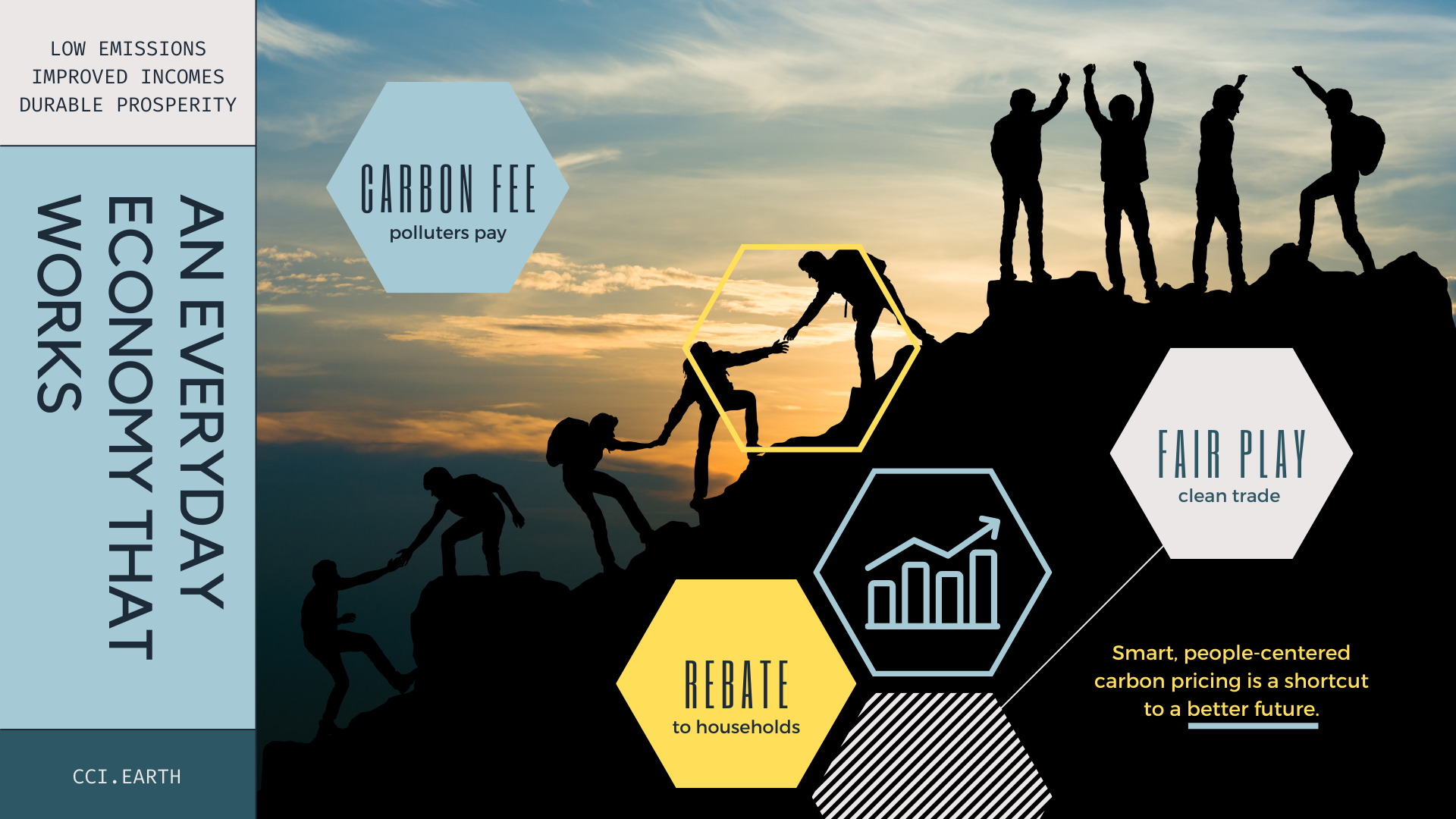Citizens’ Climate International supports people-centered, economy building carbon pricing policies that have strong price signals to rapidly decarbonize whole economies. We support climate income policies, because they:
- Put direct pressure on the polluting business model;
- Return revenues to households to ensure the added cost doesn’t fall on those who can’t afford it, and who didn’t create the problem;
- Drive rapid economy-wide decarbonization;
- Provide a basis for enhanced international cooperation toward a safe climate future.
We support smart carbon pricing policy through:
- Educational materials for our citizen volunteers;
- Co-coordinating the International Climate Income Alliance;
- Contributing to the work of the Carbon Pricing Leadership Coalition Advisory Group;
- Delivering policy guidance to decision-makers at local, national, and international levels.
In 2014, as part of that work, we published the PARIS Principles for effective, efficient, and equitable carbon pricing:
- Price pollution with a defined, steadily rising price on climate-disrupting emissions, preferably at the source.
- Add momentum. Enhance incomes; build economic value at the human scale.
- Reduce emissions effectively and accountably, by keeping the administrative structure simple and transparent.
- Internalize inefficiencies — cost and harm linked to polluting business models — incrementally, with escalating certainty and with no leakage.
- Spread by aligning price signals and supporting policies, harmonizing across borders, so pricing can be enacted country by country.
In 2014, the PARIS Principles were integral to our engagement around draft language for what would become Article 6 of the Paris Agreement, during the COP20 negotiations in December 2014, in Lima, Perú. In 2015, we supported the design and launch of the Carbon Pricing Leadership Coalition (CPLC), and have contributed regularly to its technical workshops, high-level events, and stakeholder outreach and communications efforts.
Now, we are looking to trace in detail the creative collaboration potential of emerging work on “non-market approaches” to “overall mitigation of global emissions” (OMGE), under Article 6, Paragraph 8, of the Paris Agreement. In support of this work, we have launched an International Carbon Pricing Cooperation Dashboard.
Rules for non-market approaches to OMGE hold immense promise for accelerating climate-smart finance, agriculture, land use, infrastructure, and development, by:
- Allowing nations to cooperate to secure a faster pace of decarbonization;
- Signaling wisdom of policies like climate income, to set strong carbon prices, while fostering green recovery;
- Making room for carbon border adjustments, to ensure climate leaders don’t lose trade to pollution offshoring;
- Increasing likelihood of international “floor price” for carbon pollution;
- Recognizing regulatory measures that mandate accounting, disclosure, and avoidance of carbon-related liabilities;
- Creating conditions for climate-smart, nature-positive financial instruments;
- Linking Special Drawing Rights (SDR) to Paris Agreement action and funding;
- Expanding opportunity for mainstreaming of climate-smart finance;
- Inviting integration of Earth science data platforms into financial decision-making information flows;
- Empowering existing international institutions to become engines for climate action incentives and enforcement.
In short, all of these tools can be brought to bear at global, national, and local scales, to make climate-smart practices the everyday norm. Doing that will make all of the Sustainable Development Goals more attainable. Bringing more people in more places closer to integral human development as everyday practice will mean a world that is more cooperative, more stable, and more prosperous. We need to rapidly, structurally and materially reduce global heating emissions for that to be possible, and carbon pricing can be designed to protect and empower for the marginal, the vulnerable, along with the broad and diverse working and middle classes.
Resources
- Article 6.8 of the Paris Agreement (text and overview)
- Article 6.8 Reading List
- Briefing note on non-market approaches under Article 6.8 of the Paris Agreement
- Climate-income: People-centered carbon pricing
- EU Parliament votes to advance carbon border adjustment mechanism (CBAM)
- Guardian article about the Carbon Pricing Leadership Coalition
- International Carbon Pricing Cooperation Dashboard
- International Monetary Fund review of ‘carbon price floor’ concept





